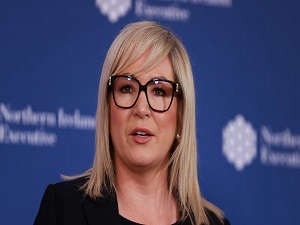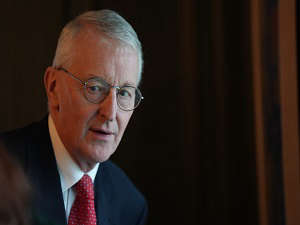
Gráinne Ní Aodha (PA)
Northern Ireland Secretary Chris Heaton-Harris said the Windsor Framework represented “decisively taking back control” from the EU.
It comes after former prime minister Boris Johnson publicly criticised the deal, saying he would find it “very difficult” to support, and that it was “not about the UK taking back control”.
In a robust defence, Mr Heaton-Harris said that the EU-UK deal would bring “prosperity to Northern Ireland like never before”.
Mr Heaton-Harris also said that he was “encouraged” by the reaction to the deal struck between European Commission president Ursula von der Leyen and UK Prime Minister Rishi Sunak on Monday.
“With our deal, we are decisively taking back control in a host of areas from Brussels,” he said in a statement on Thursday.
“It ensures unfettered access for Northern Ireland-made goods to the whole UK market, restores the balance of the Belfast (Good Friday) Agreement and provides Stormont with the opportunity to reject the application of any harmful new EU rules in the few areas in which they remain.
“The agreement rewrites the treaty to end the presumption of continuing alignment on regulations through the Stormont brake, puts medicines supply back in the UK’s hands, restores critical tax freedoms and ensures that the same food can be on supermarket shelves in Northern Ireland as the rest of the UK through our green lane.
“And this deal is good for the Union as it will bring investment and prosperity to Northern Ireland like never before.
“We have never said this is the perfect solution, but it is a better option than the Protocol Bill, which kept automatic alignment with EU law for red lane trade at Northern Ireland ports and kept the full jurisdiction of the European Court of Justice in international law.
“As we move forward we will seize every opportunity to diverge from where we are today where it offers benefits to the whole UK.”
The DUP, which is currently boycotting the Stormont powersharing institutions, has said it will study the new framework against its seven tests before reaching a “collective” conclusion.
However, a number of party members have already been vocal in expressing concerns about the deal.



 O’Neill praises Pope’s commitment to peace as she confirms funeral attendance
O’Neill praises Pope’s commitment to peace as she confirms funeral attendance
 Woman suffers ‘traumatic ordeal’ in roadside robbery in Newry
Woman suffers ‘traumatic ordeal’ in roadside robbery in Newry
 Shock over record number of attacks on ambulance crew
Shock over record number of attacks on ambulance crew
 Police investigate petrol bomb attack at Co Antrim flat
Police investigate petrol bomb attack at Co Antrim flat
 Benn to discuss legacy issues with Harris at Hillsborough Castle
Benn to discuss legacy issues with Harris at Hillsborough Castle